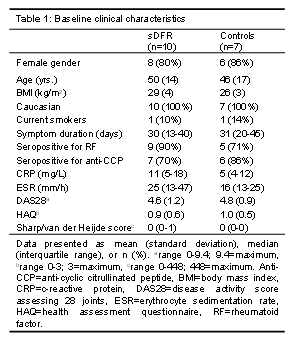Session Information
Date: Wednesday, October 24, 2018
Title: 6W009 ACR Abstract: RA–Etiology & Pathogenesis II (2898–2903)
Session Type: ACR Concurrent Abstract Session
Session Time: 9:00AM-10:30AM
Background/Purpose: We previously identified several co-expressed genes associated with achieving sustained drug-free remission (sDFR) following a methotrexate (MTX)-based strategy in early rheumatoid arthritis (RA).1 The aim of the present analyses was to identify, within the same patients, inflammatory proteins associated with achieving sDFR and to study associated biological pathways and compare these with those previously found in the transcriptomic analyses.
Methods: Data was used from patients participating in the U-Act-Early trial who achieved sDFR (i.e. being drug-free for ≥3 months) after therapy with a treat-to-target MTX-based strategy (n=10).2 When the treatment target, sustained remission (disease activity scores assessing 28 joints (DAS28) <2.6 and ≤4 swollen joints for ≥24 weeks), was achieved, therapy was tapered and thereafter discontinued. Controls were patients without a drug-free period during the study (n=7). In baseline serum samples, 85 proteins were measured and analysed using multi-analyte profiling. Partial least square discriminant analysis (PLSDA) was used to identify relevant proteins, which were subsequently used for pathway analyses in the Genes Ontology (GO) and Kyoto Encyclopedia of Genes and Genomes (KEGG) databases.
Results: Table 1 shows baseline clinical characteristics; no significant differences were found between those achieving sDFR vs. controls (p>0.14). PLSDA identified 13 proteins, of which pathway analyses yielded 117 significant GO terms and 14 KEGG pathways (Fig. 1). Comparison of the significantly enriched pathways found in the transcriptomic analyses and those in the present study yielded 33 corresponding GO terms, including “janus kinase signal transducer and activator of transcription (JAK-STAT) cascade” (p≤8.97E-03) and “positive regulation of tyrosine phosphorylation of STAT protein” (p≤8.37E-03), which is important for signal transduction in the JAK-STAT pathway. Additionally, one KEGG pathway (“JAK-STAT signalling pathway”) was also found to be significantly enriched in both transcriptional and proteomic analyses (p≤2.22E-04).
Conclusion: Biological processes important for effectively reducing inflammation in new-onset RA, treated to target with a MTX-based strategy, were found to be associated with activity of JAK-STAT signalling components. Involvement of this pathway was found both in the analyses of the transcriptome and proteome, demonstrating a specific JAK-STAT profile at baseline affects the immunosuppressive efficacy of MTX.
References:
1. Teitsma XM, et al. Arthritis Res Ther 2017;19:170.
2. Bijlsma JW, et al. Lancet 2016;388:343-55.
To cite this abstract in AMA style:
Teitsma XM, Jacobs JWG, Concepcion AN, Pethö-Schramm A, Borm ME, van Laar J, Bijlsma JWJ, Lafeber FP. Sustained Drug-Free Remission in Early RA Following Methotrexate-Based Strategy: Role of the JAK-STAT Pathway [abstract]. Arthritis Rheumatol. 2018; 70 (suppl 9). https://acrabstracts.org/abstract/sustained-drug-free-remission-in-early-ra-following-methotrexate-based-strategy-role-of-the-jak-stat-pathway/. Accessed .« Back to 2018 ACR/ARHP Annual Meeting
ACR Meeting Abstracts - https://acrabstracts.org/abstract/sustained-drug-free-remission-in-early-ra-following-methotrexate-based-strategy-role-of-the-jak-stat-pathway/


